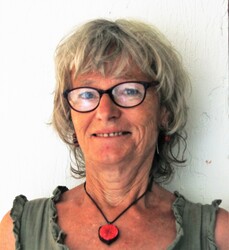|
Short Fiction ~ Gillian Brown (First Prize, Strands International Flash Fiction Competition - 2) I kick open the padded door to the cell of the new prisoner, Angelo Harper. From his name, I’ve conjured up a tough guy with swarthy skin and massive biceps, covered in tattoos. Instead, I find a man so pale it looks like he’s never seen the sun. He has an angular face and little flesh on his body. I’m somewhat relieved, until I notice the one thing that stands out. His staring grey eyes are cold enough to freeze my blood. 'Don't come any closer,' he says. I’ve been a screw long enough to know when to mask my face. I push my way through his wall of aggression and dump his dish of porridge on the table, which is fixed to the floor. He jangles the chain attached to his ankle with a menacing clink. I turn abruptly and march out, slamming the door behind me. The prison psychiatrist, Dr Harris – best known around here as Psycho – is standing outside. He’s doubtless up to his usual tricks, spying through the peephole. He places a hand on my arm. 'You know what Angelo told the trial judge?’ I shrug, feigning disinterest. ‘He said he killed the two boys to save them from their father's abuse.’ ‘That’s his defence lawyer putting words into his mouth.’ ‘Maybe. But the forensic psychologist backed him up. Angelo suffered constant abuse in his own childhood. He's never known love.' I sigh. ‘The usual bullshit.’ ‘I’m not so sure. He told me voices in his head told him to do it. The boys were his cousins, you know. It was a humane death, if murder can be such a thing. There was no violence involved, he simply spiked their drinks with drugs legally available on the Internet.’ ‘The vibes he sends me are far from humane. Positively aggressive in fact.’ ‘Hmm. A common reaction in such cases. Suppressed fear.’ Psycho scratches his stubbly chin. 'I've an idea.’ His madcap plan comes into effect during the cons' next exercise session. He lets three cats into the yard. One glance at the prisoners and two skitter off, tails scraping the ground behind them. The third, a battered and scarred tabby, sits down and twitches her whiskers. She sniffs, stands up and raises her tail in the air. Seemingly without fear, she pads forward straight towards Angelo. He narrows his eyes. A confused look crosses his face. 'I hate cats,' he shouts, aiming his right foot. Too Late. The cat claws at his leg. A dark red stain seeps through his trousers. The cat darts off. I catch Psycho’s eye and give him an I-told-you-so look. He shrugs. The experiment is put on hold. A week later, Angelo glares at me in his usual manner and mumbles, 'Where's the tiger?' I frown, until what he means dawns on me. 'So you like cats now, do you?' 'Course not.’ His shriek of a laugh sends a chill up my spine. ‘I want to strangle it.' I don’t doubt his words, but when I tell Psycho, I’m surprised to see his eyes light up. 'As I thought. There's an emotional connexion here. Love…hate…maybe both,’ he mutters, rubbing his hands together. ‘Conflict. It’s a start.’ I shake my head. Psychiatric claptrap. That evening, Psycho brings the tabby back. He lets her into Angelo's cell and double bolts the door. I grab Psycho’s sleeve. ‘I’m no cat lover, but what about the poor animal?’ I’m already thinking about the bloody mess I’ll need to clean up. Psycho fixes his eye to the peephole and relays the scenario as it unfolds. 'Hmm. Neither of them knows what to do. They’re both standing rigid, eyes locked, having a staring match.' He ducks slightly aside, so we can share the view. 'Take a look.' The apprehension between them is palpable. A mixture of bravado and fear seems to permeate the cell. Suddenly the cat arches her back. Angelo reaches out a tentative, bony hand. I gasp. Psycho is breathing heavily beside me. Inside the cell the cat and the prisoner continue to eye each other up in a wary silence. The tension mounts. Siding with the cat, I whisper. ‘Don’t! It’s a trick.’ But it’s Angelo who backs off. A flash of uncertainty crosses his face. He turns to the door, as if he has guessed we are watching. Psycho shakes his head. ‘If he knows he has an audience, my experiment is worthless.’ He’s right. Angelo lowers his head and reaches forward with both hands towards the cat’s neck. Psycho unbolts the door just in time for the cat to dart out, leaving a high-pitched yowl behind her. I don’t see Angelo again until just before lights-out that night, during my habitual check of every cell. Looking through his peep-hole, I can barely believe my eyes. He is sitting, chin in hand, on his bed, with tears rolling down his cheeks. I should leave him be, but I can’t resist the chance to embarrass him. As I open the door to make a snarky comment, he turns his head away to hide his face. At the same time, something soft brushes past my legs. I forget what I was going to say as – out of nowhere – the cat slips into the cell. My jaw drops as the cat flattens her ears and lets out a low growl, sounding more like a tiger than a pussycat. Angelo’s head jerks back towards the sound. His watery eyes lock onto the cat. He presses his lips together. His chest heaves. He seems to have forgotten I’m here. I hold my breath, ready to take action when necessary. The cat takes a hesitant step towards Angelo and rubs herself against his legs. She raises the tip of her tail high in the air, and twitches it from side to side. The air is electric. Angelo bends down. ‘Hello, Tiger,’ he says and gently strokes her back.  Gillian started out as a travel writer but now concentrates on fiction. Her inspiration often comes from her travels or real life experiences. Motivation comes from short story competitions, for which she has a mild – but enjoyable – addiction. She has had stories published in magazines, in anthologies and online and won and been shortlisted in various competitions.
0 Comments
(Second Prize, Strands International Flash Fiction Competition - 2) The Drugmart advertisement in Saturday’s paper caught Beryl’s eye. YesterYear with Yardley it said, under a grainy picture. The illustration struck a chord: of her and Howard going to the pictures; going to the fair; going on the train to the seaside. Howard was good at deciding where and when to go. Goodness they had such times together. Beryl never went down the High Street. Even now, she didn’t know if she should. In the end she got off the bus before she had chance to change her mind for a fourth, or was it a fifth time? Unused to the roar of the traffic, she wondered about removing her hearing aid. But then again, she wouldn’t be able to hear if someone hooted. Would she? Beryl soon found Drugmart. She wanted to go on Wednesday, but couldn’t decide whether to wear her red or navy coat. By the time she’d decided, she’d missed the bus and they only ran twice a week. Howard had been gone for over twenty years, but it was still hard without him. He would have said, “Wear the red one Toots,” right off the bat. The cosmetics department with its glossy consultants lured Beryl in. She pulled off her plastic rain hat and fluffed up her perm, glancing in one of the many mirrors, wondering who the wizened, tired face looking back at her belonged to. “Can I help you?” the glossy consultant smiled a painted smile. “Um,” said Beryl. “Er, I think it was Pink Capri. The lipstick.” “Pink Capri?” said Miss Glossy, “let’s see what we have in our Retro Range.” Beryl slumped against the counter. She heard faint voices. People’s faces were just a blur mingling with shiny articles swimming up and around her: mirrors with old crones, bottles and potions, racks of lipsticks, and the life-sized grainy photo of her and Howard at the fair. A teary Miss Glossy stood beside Beryl’s cordoned off lifeless body waiting for the paramedics to arrive. She gently tucked a lipstick in Beryl’s red coat pocket. “I found your Pink Capri,” she said.  Internationally published, S.B. Borgersen writes, knits socks, and walks her smashing dogs on the south shore of Nova Scotia. Her favoured genres are short and micro fiction, and poetry. She has thirteen draft novellas gathering dust. A member of The Nova Scotia Writers’ Federation, Writers Abroad, and a founding member of The Liverpool Literary Society, Sue judged the Atlantic Writing Competition (Poetry) 2016 and Hysteria (Poetry) 2017. www.sueborgersen.com Short Fiction ~ Bruce Meyer (Third Prize, Strands International Flash Fiction Competition - 2) A young woman has been bequeathed, in perpetuity, the windfalls from her uncle’s orchard. She will never own the orchard. That gift went to someone else, a distant cousin who never visited the uncle when he was dying. The windfalls, however, are not bad as windfalls go. Some of the apples are bruised, some have small brown spots. She will never offer anyone apples with worms in them. That would not be right. The apple belongs to the worm who has found it. Other fruits may not be the best apples a person can buy, but they will do for pies or tarts or for those who are hungry and simply need most of an apple to eat. Every morning from late August to early October when the rains pour and it is too cold to sit outside and sell apples, the woman walks the distance into town, carrying two butter boxes full of apples and a length of wooden planking under her arm. She sets up her stand facing the church door. Before setting the apples out for passersby to inspect, she polishes them on her white apron so that the skins catch and reflect the light, gleaming as if they are striving to be better than what they are though she never makes any illusions about what they are. If people ask she tells them, honestly, that the apples are windfalls. Those who know her respect her honesty. The apples are all she has to live on. Over the years, people count on her being there. It is reassuring to see her there, patient, waiting, selling her apples as best she can. There is a rumor that she was almost married. A young man who cut hay in the orchard might have fallen in love with her. There are days in the harvest season when she sits in front of her plank and butter boxes stares up at the sky above the cross on the church steeple. She seems far away. Some people says she has a look of love in her eyes. No one is certain, though. The young man who cuts the hay and trims the floor of the orchard short, so sheep can safely graze there, never comes to town. No one has any idea of what he looks like or if he even exists. But there are rumors. That’s the way stories go. They aren’t made of certainties. On the plank she arranges the apples in ranks as if they are soldiers who are to be inspected before they are sent off to die. As the boys and men pass through the town square on their way to the train station, they wear long coats, steel helmets, and carry rucksacks filled with tinned food but never anything fresh. She hands each of them apples. They lean from the train car windows and kiss her, but she knows the kisses are not for her. They are for the world each of them is leaving behind, a world where they will not taste apples. During those times of sadness, most of her fruit rotted before it was sold. Some of the apples, when the townspeople were destitute and hungry, she merely gives away because charity is the least one can do in the face of suffering. Some of her fruits are kicked to the gutter when the town is invaded. Others are confiscated to feed the invaders. Even when she tried to keep some for herself, they were confiscated. One soldier pelts her with her own fruit saying that she is a criminal to sell rotten apples in the middle of the town square, especially facing the church door where God peers out between the heavy oak slabs and sees her for the awful wretch she has become. Then, the invaders go away. The apples are no better and no worse than they have always been though there is something missing from the taste that was once so familiar and inviting to her. The trees from whose rooted feet she gathered the windfalls are spare and scrawny as her own limbs have become. She is no longer able to bend down to pick up the windfalls. Her back aches and her legs have grown stiff from sitting on the pavement of the town square. By the time she is an old woman, she has sold her apples for more than five decades. She has watched the blossoms burst from nodes in the spring, seen the petals scatter on the warm breezes of early summer, and witnessed the fruit ripen in the sun and grow red and round and full more times than she can count. She would like someone to listen as she tells the story of the apples, but no on stops long enough to hear her out. She has seen the fruit of her life – the apples, the boys she loved when she was young, and the men who came later full of ardor and eagerness to experience the hardships of the world where they thought they could test themselves against its violence and its pain, go off to wars and not return. There is one apple, however, that never turned brown. She was tempted to eat it during the harder times but held herself in check. She kept it in the pocket of her white apron, a perfect, round, red apple that never blemished or shrank or grew too tangy to be near. She takes the perfect apple from her apron pocket, writes a note, and before she walks away from the butter boxes and the plank she has knelt before as if an altar for more years of her life than she can recall, she takes a pencil and writes a message on the paper and lays it beneath the apple. “This apple is my story,” is all the message says.  Bruce Meyer is author or editor of over sixty-three books of poetry, short fiction, flash fiction, non-fiction, and literary journalism. His next book of flash fiction, Down in the Ground, will be published by Guernica Editions in 2020. He lives in Barrie, Ontario. (Honourable mention, Strands International Flash Fiction Competition - 2) The local cemetery, a playground for Luke and his friends all year round, became something different at Halloween. Stories of witches, ghouls and goblins, and the tales they learned in school about All Souls Day and All Hallow’s Eve made it the only place they would go for their Halloween party. Here they would compete to tell each other the scariest stories about flesh eating ghouls, and evil spirits returning from the dead. At eleven, Luke was the oldest of the four pals. Two of the others were ten, the third almost Luke’s age. The year before, they had only succeeded in climbing over the locked gates, before Luke said he had seen Salem’s red eyes flaming from behind the crooked Celtic cross. Salem, the reason the boys screamed and shouted that day last Halloween as they clambered back over the gate, was an enormous black dog owned by an old woman who lived alone in a tiny white house outside their country town. Everyone said that the old woman was a witch and that Salem was a hound from hell. Salem’s reputation came about from his habit of turning up outside the door of a home where inside someone lay dying. There the giant black dog would begin to howl, a long drawn-out wail that would start off as a deep base sound and graduate to a high shift-pitch so mournful it could curdle even the blood of a banshee. A year older now, the boys decided they were bigger and braver. Inside the graveyard before his mates, Luke called in a loud whisper for them to follow him. But the three boys were busy tossing a coin to decide who would be the first between them to climb over the gate. Finally, they agreed to scramble over the wrought iron gates together. Just then, Luke heard behind him the distinctive panting of a dog. Strangely unafraid, he twisted about. There, like some black demon that had absconded from the kennels of hell, stood Salem. With eyes burning as red as infernal embers, and teeth as white as bleached bones, the black hound blinked once. He then shifted about uneasily, before trotting off into the shadows. Without knowing the reason why he should, Luke felt a compulsion urging him to follow. He did. But as he moved through the graveyard, now lit by the bony light thrown by the moon, Luke saw all about him pale, hazy figures of men, women and children. The figures were eyeless and dressed in ragged clothes. They stretched out their arms towards him before disappearing. And still Luke was unafraid. Not until he reached Salem, who had led him to a small grey headstone with newly turned earth, did Luke remember what it felt like to experience true horror. Inside his body a phantom hand grasped his stomach and squeezed as he read the inscription in black ink: Our Beautiful Boy Forever, Forever a Boy Luke Belton 15-08-2007 – 01-05-2018  A prize nominee for the PEN/O’Henry Award, and a prize nominee for the Pushcart Prize, Steve Wade’s fiction has been published widely in print and in digital form. His work has won awards and been placed in writing competitions. His fiction has been published in over forty-five print publications, including Lakeview International Journal of Literature and Arts, Crannog, Boyne Berries, Zenfri Publications, New Fables, Gem Street, Grey Sparrow, Fjords Arts and Literary Review, and Aesthetica Creative Works Annual. He has won the Delvin Garradrimna Annual Short Story Competition four times. www.stephenwade.ie Short Fiction ~ Sara Siddiqui Chansarkar (Honourable mention, Strands International Flash Fiction Competition - 2) A boiled half-egg, bright yellow in the center, jumps out of my lunchbox as if it was waiting to be freed. I catch it before it hits the ground. Two squished half-buns and one flattened half-egg are still inside the plastic box. I lick the salted butter off one of the half-buns wondering how my lunch doubled today. We couldn’t have grown rich overnight. Every morning, my elder sister, Reena, boils an egg and butters a bun. Then, she cuts the egg and the bun right through their centers with Mother’s old, but sharp, knife. After sprinkling pepper on the yolk, she packs one half-egg and one half-bun in her tiny lunchbox and the other set in mine. Mother sleeps in because she sews other women’s dresses and blouses till the first light of dawn. The whir of her rickety sewing machine has always been our lullaby. Reena and I help her by fastening buttons and stitching buttonholes in the garments after school while other kids play hopscotch or skip ropes. Father labors in the cornfields, from dawn to dusk, to send us to the grammar school meant for rich children because he believes good education is the key to a comfortable life. Once you get high-paying jobs, he says, you will have platefuls of food and trunkfuls of dresses. I feel my left toe pierce a hole in my sock and touch the roof of my tight shoe. Thankfully, no one can see what happens inside a shoe. Reena, a year older, gets a new uniform and a pair of new shoes each school year while I am given her old ones. This year, Mother had to redo the hem of Reena’s old pinafore to make it touch my knees. Thus, the bottom inch of my dress is a chocolate-brown while the rest of it is the color of weak tea. I scrub and scrub the dark part with soap on Sundays but it refuses to fade. Yesterday, I noticed a bunch of my 6th-grade classmates pointing to the discolored edge of my pinafore. I wanted to box their ears but did not. I sit on a bench and take tiny bites of the egg, let it linger on my tongue, and savor the sudden good fortune. As I lift the second half-bun, I see Reena, by the row of faucets, in the playground. Her right hand is under a faucet, forming a cup, from which she is drinking water; her empty left hand is behind her back. Yesterday, when walking home from school, my stomach growled so much I told Reena I wished I had no sister, so I could eat a full lunch. My eyes sting and my hands tremble. I replace the half-bun in the box beside the half-egg and run towards my sister.  Sara Siddiqui Chansarkar is an Indian American. She was born in a middle-class family in India and will forever be indebted to her parents for educating her beyond their means. She is a Pushcart and Best of the Net nominee; her work has been published online in The Ellipsis zine, Lunch Ticket, Star82 Review, Cabinet of Heed, and also in print, most recently in the Chicken Soup for the Soul series. She blogs at Puny Fingers and can be reached at twitter @PunyFingers. (Honourable mention, Strands International Flash Fiction Competition - 2) I’d compose music on a piano if I could. Friends would stop by and I’d collect all the lined pages in a bundle, open the seat, shove them in, and while we visited, I’d sit on my masterpiece, holding it down, squashed in its tiny crypt. I’d take time to chat and catch up, not let my eyes go all squirrelly, glancing repeatedly at the clock as the morning wore into noon. They’d suggest lunch and by then I’d be hungry so we’d meet in a coffee shop where lots of pregnant women hovered over soy this and decaf that. Another friend would stop by our table and ask how it’s going. I’d say, “Well, you know, a composer’s life isn’t for everyone.” They’d say, “I hear you, man.” The commiserating would fade into small talk, and then, after a while, they’d leave and the first friend would treat because everyone knows that I’m a starving artist with something like six dollars left in my checking account. I’d return to my sticky, hot house because I left one window open, enough to fill the whole place with summer air. I’d go outside, mow the lawn while considering sharp notes and opaque motifs. The next day, I wouldn’t even glance at what I wrote the morning before because I’d fallen asleep ashamed of thinking I could be great enough to construct a sonata, let alone a masterful one, so I’d start another. Every day brings something new, jotted down, tucked away, forgotten. When I ran out of room in the piano seat, I’d buy a footlocker like I’ve seen my friend’s kid haul off to college, all black and metal. I’d fill that one, and another, and stack them in the spare room because even though it’s made up for my logical, going-to-be-an-accountant-to-make-some-money-dammit daughter, she rarely visits anymore, plus she hasn’t spent the night in years. Maybe I’d die placing one trunk on top of another or from a heart attack or by falling chest first onto a metronome, then every note I ever wrote would be bequeathed to her. I imagine her opening the trunks and it would be like reading my journal. All of my love for her made into music could burst through her heart and she’d know how much I adored her, but I didn’t take piano lessons and she was aborted before she was really even a girl so I listen to classical music while I write all day waiting for friends to drop by instead.  T. L. Sherwood adores flash fiction but abhors flash flooding. Her work appears or is forthcoming in Bending Genres, New World Writing, The Dead Mule School of Southern Literature, On the Premises, and The Bacopa Review. She blogs twice a month about her creekside reflections at http://tlsherwood.wordpress.com and she's currently working on a novel. Aamer Hussein ~ Short Fiction You think you can see the plum tree from the window when you rise at dawn after a few hours of sleep. It’s only a few yards away from your door and if you make the effort – one step, two steps, ten steps – you’ll get there. After your tasks are done, you tell yourself. It may just be a blur in the mist. You sit down to delete old messages from your phone, clear caches, and answer a message from Lara. She dreamed of you last night, she writes. You haven’t spoken to her since you parted on a shrill note, months ago. You don’t know whether to expect a duet or a duel, but it is neither: between the formal lines of your exchange there’s a ripple of a tentative understanding. Three of my friends died last year one after the other, you tell her. One, my childhood sweetheart, of tongue cancer, one after a series of strokes, and the third – well, her immune system was…. The phone rings: it’s a younger friend whose agent has rejected a collection of stories that three publishers turned down. All you can offer is cold comfort: Been there, done that, you want to say. You can hardly claim to be doing very well yourself. But he’s stuck in Lahore – flights are suspended because of border skirmishes – and he has time to talk. After 28 minutes of conversation you’re drained. 11:15 and that book you were meant to finish is lying open, spine upward, on the arm of your chair. You return to the laptop to complete the message you were sending to Lara. What you’d written is hardly a response to anything she’d told you. You delete the sentences, you start again, but the words don’t come. It’s nearly 12 when you finally put on your shoes and leave the house. One step, two steps, twelve steps – and you’re at the plum tree. It’s in full bloom, pink-white blossoms pointing to the sky or tilting to the earth. It only blooms in February, for a few days, but till the flowers wither and fall it becomes your favourite companion. The sun’s in your eyes but your body knows the moves: curve hip to the left, mobile phone aimed at the tree, curve shoulder to the left, bend knees: and you’ll have the images you want, though they’ll always surprise you with an unusual pattern, an unexpected trick of light. There’s a message on your phone as you walk back laden with the day’s shopping, from Alam, a young friend you wrote to during your sleepless hours. What is platonic love, you’d mused: recognising potential and keeping a distance? Or leaving intractable spaces around the other, while you leave yourself open to invasion? Is there always an element of the unspoken, the unrequited? (Once you’d loved Lara with a love that she called true; at times it was a blue fire, at others like summer rain. Across absences and distances. It was a bodiless love of a kind you’d only known as a child when you were far away from mother, father, uncles and grandparents. Even when she loved another man and then another your love remained, now a still lake, now a pile of embers. Then one day she flung it in your face. And there was nothing left but a rocky hollow in your entrails.) Alam, as always, uses your words as a diving board for his own reflections. That’s what you like about your exchanges. Any kind of relationship, he writes, requires trust. According to my perspective, when selfishness enters, it is not even a relationship; the world becomes meaningless when someone deceives you, it doesn’t make sense, whatever sort of relationship you lose. I was cheated of money once, you type, by someone I trusted. When someone breaks your trust it’s worse than being beaten, Alam types. You know what I’d like - he switches tone - is to be a tree, to give shade to the weary - come rain, come shine. Abu Bakr Siddique, peace be upon him, once said he wished he could be a tree, or a leaf or a branch of it, to help those who need my shade, rather than knowing I will go to heaven. Look at this, you respond, sending pictures of my tree. I will call it by your name. I will be a tree, he types, and goes offline. He often disappears mid-sentence; you wonder whether he retires into reverie, or into his Cancerian shell, tired after reading all night and sitting in classes all morning, he even falls asleep. Your book is waiting. But you return to the laptop to answer Lara’s message. As long as you breathe, you type, it’s easier to fight back than to give up or let go. You know you’re not really writing to her. You don’t know who it is you’re writing to. They come, they go, these loves and losses – do they trickle away, drop by drop, or do they freeze? And if there’s a thaw, what depths of reflection remain? Let your book wait. Now, looking at the sun through the open window, you think of how you watched the moon grow for nearly thirteen days, from slender curve to burgeoning globe, and how one night it hung whitely over the leafless trees and when you tried to capture it the moon hid behind a pinkish cloud. And you’re thinking, as your eyes close, about legendary trees: the palm tree that offered Mary its fruit and its shade, and the tree at the limit which has on its leaves the names of those about to die, and the tree of paradise, and the almond and the cherry you wait for eleven months a year, and as sleep overwhelms you, you think that the plum tree offers no shade but how lushly it blooms, and how in your photographs it always appears to be so much taller than it really is.  Born and brought up in Karachi, Aamer Hussein studied for two years in the Nilgiris, India, before moving to London, aged 15, in 1970. He worked in the now defunct BCCI, took a degree in South Asian studies from SOAS, and later studied French, Philosophy and Psychoanalysis. He began to publish short fiction, reviews and articles in journals and anthologies in 1987. His first collection of stories, 'Mirror to the Sun', appeared in 1993, to be followed by three further collections – including 'Insomnia' – and two novels, 'Another Gulmohar Tree' (2009) and 'The Cloud Messenger' (2011). '37 Bridges and Other Stories' came out in 2015, and his latest work is Hermitage (2018). He writes in both English and Urdu, still lives in London, and travels frequently to Pakistan. |
StrandsFiction~Poetry~Translations~Reviews~Interviews~Visual Arts Archives
April 2024
Categories |
 RSS Feed
RSS Feed